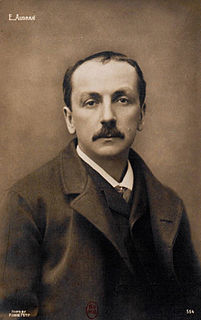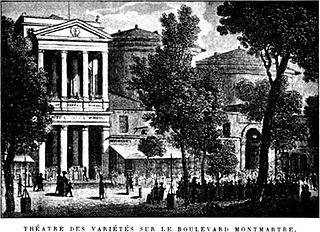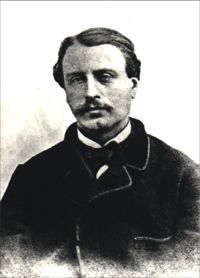
Henri Meilhac was a French dramatist and opera librettist.

Achille Edmond Audran was a French composer best known for several internationally successful comic operas, including Les noces d'Olivette (1879), La mascotte (1880), Gillette de Narbonne (1882), La cigale et la fourmi (1886), Miss Helyett (1890), and La poupée (1896).

L'île de Tulipatan is an opéra bouffe, in one act by Jacques Offenbach to an original French libretto by Henri Chivot and Alfred Duru.

Chilpéric is an opéra bouffe with libretto and music by Hervé, first produced in Paris on 24 October 1868 at the Théâtre des Folies-Dramatiques. A burlesque of the medieval, Chilpéric starred Hervé in the title role.

The Théâtre des Variétés is a theatre and "salle de spectacles" at 7-8, boulevard Montmartre, 2nd arrondissement, in Paris. It was declared a monument historique in 1975.

Henri Charles Antoine Gaston Serpette was a French composer, best known for his operettas. After winning the prestigious Prix de Rome as a student at the Paris Conservatoire, he was expected to pursue a career in serious music. Instead, he turned to operetta, writing more than twenty full-length pieces between 1874 and 1900. He accepted some conducting work and also served as a critic and journalist on a number of French newspapers and magazines.
Maurice Yvain was a French composer, noted for his operettas of the 1920s and 1930s, some of which were written for Mistinguett, at one time the best-paid female entertainer in the world. In the 1930s and 1940s he became a major success in the United States and several of his pieces appeared in the famous Ziegfeld Follies on Broadway. He also composed music for several films of notable directors such as Anatole Litvak, Julien Duvivier and Henri-Georges Clouzot and his music blended with the then "spirit of Paris".
Adolphe Jaime, called Jaime fils, was a 19th-century French vaudevillist and librettist. He was the son of Ernest Jaime (1804-1884), also a playwright.
Henri Marie Gabriel Blondeau was a French playwright, librettist and chansonnier, famous for his song Frou-frou.
Antoine Banés, real name Antoine Anatole, was a French composer of operettas and ballets.

Alfred Duru was a 19th-century French playwright and operetta librettist who collaborated on more than 40 librettos for the leading French composers of operetta: Hervé, Offenbach, Lecocq and Audran.
Eugène Gaston Mestépès was a 19th-century French librettist, playwright and theatre director.
Frédéric Barbier was a 19th-century French composer.
Les Chevaliers de la Table ronde may refer to:

Maria Conchita Gélabert (1857–1922) was a lyrical artist and actress of Spanish origin who performed in France at the end of the 19th century.

Fleur-de-Thé (Teaflower) is a three-act opéra bouffe with music by Charles Lecocq and words by Alfred Duru and Henri Chivot. The story centres on a French bar-keeper, who is saved from a bigamous marriage to an aristocratic young local by the intervention of his real wife, with the aid of champagne and French sailors. It is set in China to appeal to the 1860s French fashion for Chinoiserie.

Le grand mogol is an opéra bouffe with music by Edmond Audran. The opera depicts the love between an Indian prince and a young Parisienne, and the unsuccessful attempts of conspirators to thwart their romance.

L'œil crevé is an opéra bouffe with libretto and music by Hervé, first produced in Paris on 12 October 1867 at the Théâtre des Folies-Dramatiques.













